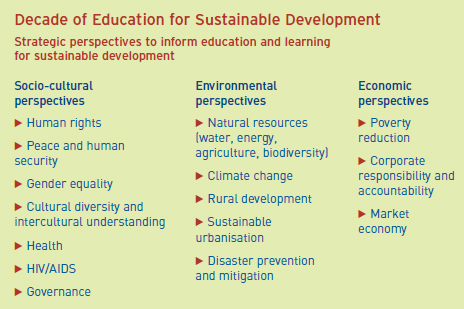|


|
 |
We don't inherit - we borrow
|
|
|
|
| Sustainability and sustainable development - another controversy? |
|
| Sustainability is the ability to sustain (keep going) and contains the notion of responsibility towards the next generations and the acknowledgement that we don't inherit, but we borrow. However, the questions is, to keep going where? The concept itself is subject to international disagreement since the early '80s |
and although there are several numbers of reports suggesting that humankind is living beyond earth's carrying capacity, sustainability and especially sustainable development means different things to different people. 11
Sustainable Development (SD) is a modern concept which emerged as a part of the Brundtland Report, Our Common Future, at the World Commission for Economic Development in 1987. It was then defined as "a process of |

|
change in which the exploitation of resources, direction of investments, orientation of technological development, and institutional change are made consistent with future as well as present needs" 12, in other words, in the pursuit of an ecologically benign culture, a "development that meets the needs of the present without compromising the ability of future generations to meet their own needs". 13
There are three main types of perspectives formulated by the DESD International Implementation Scheme containing the concerns and challenges that must be addressed to achieve sustainability - socio-cultural, environmental and economic: 14

The perspectives illustrated above were based on the 'three pillars of sustainability', (the key areas of the concept): Society, Environment, and Economy.
However, other SD interpretations have led the term to get criticized as ambiguous. Development is usually associated to economic development and growth, which contradict the notion of sustainability itself. Herman Daly, ecological economist, maintains in Beyond Growth that economic growth cannot be sustainable in a finite environment. From an extreme angle, the same logic applies to 'sustainable' cell growth in humans, which simply is "cancer", described by Edward Abbey in The Journey Home, 1977: 'Growth for the sake of growth is the ideology of the cancer cell' says Abbey, so it seems that one must choose which kind of sustainability they want. As a participant from India at the virtual conference on Technical Vocational Education and Training stated, 'environmental issues are nice, but not a priority, social sustainability might be a priority'. Nuclear catastrophes, natural disasters, pollution, anthropogenic global warming, soil degradation, the depletion and extinction of species etc might be a concern of financially healthy people in the western world, in Africa however it would also not be a priority but rather a 'nice-to-have', food and shelter featuring first in the list of priorities. Similarly, the 'act locally think globally' concept is incomprehensible to many people in Africa and elsewhere, as globally more than 1.3 billion people live in poverty, unable to envision the future of the coming generations but only the daily milk supply for their baby. | |
 |
 |
|
| |
|
|
|
|
|

|
|
